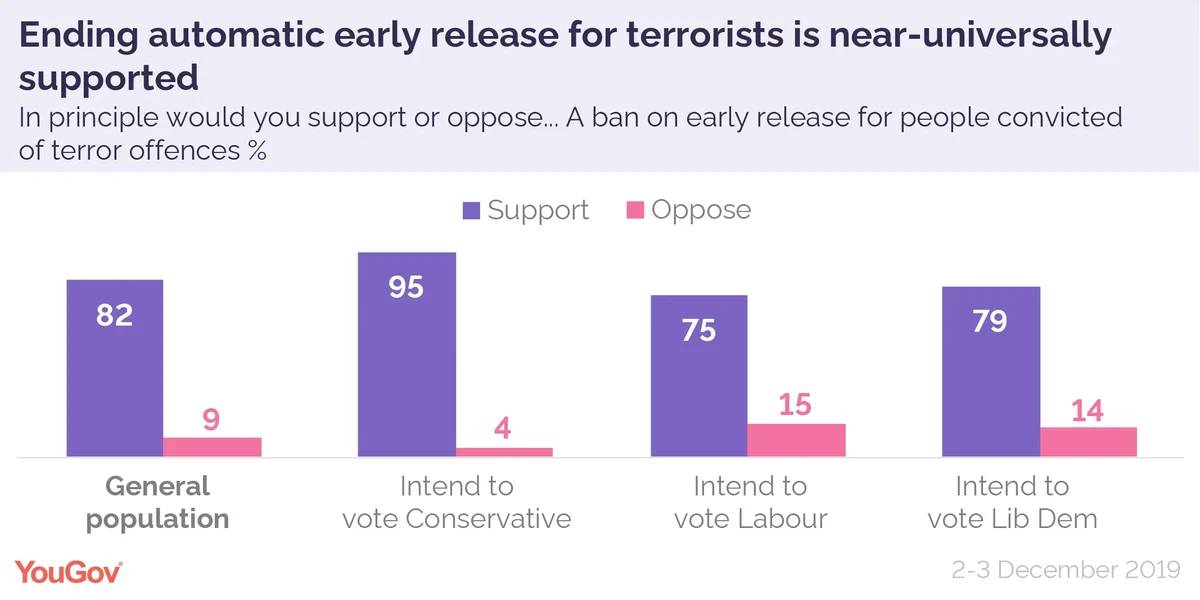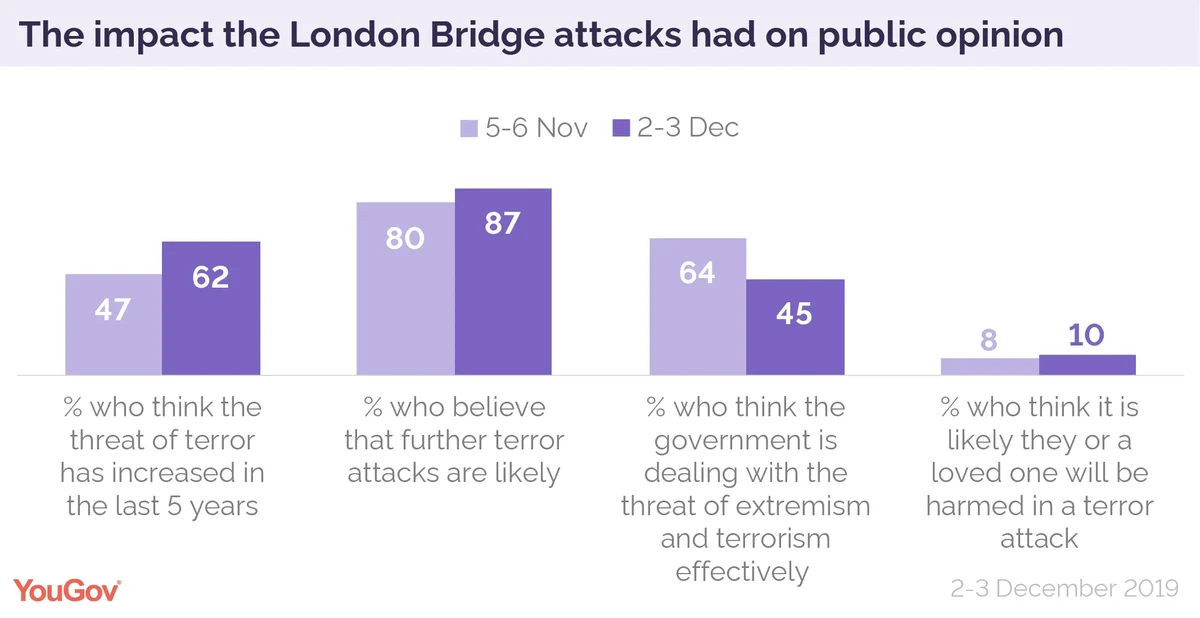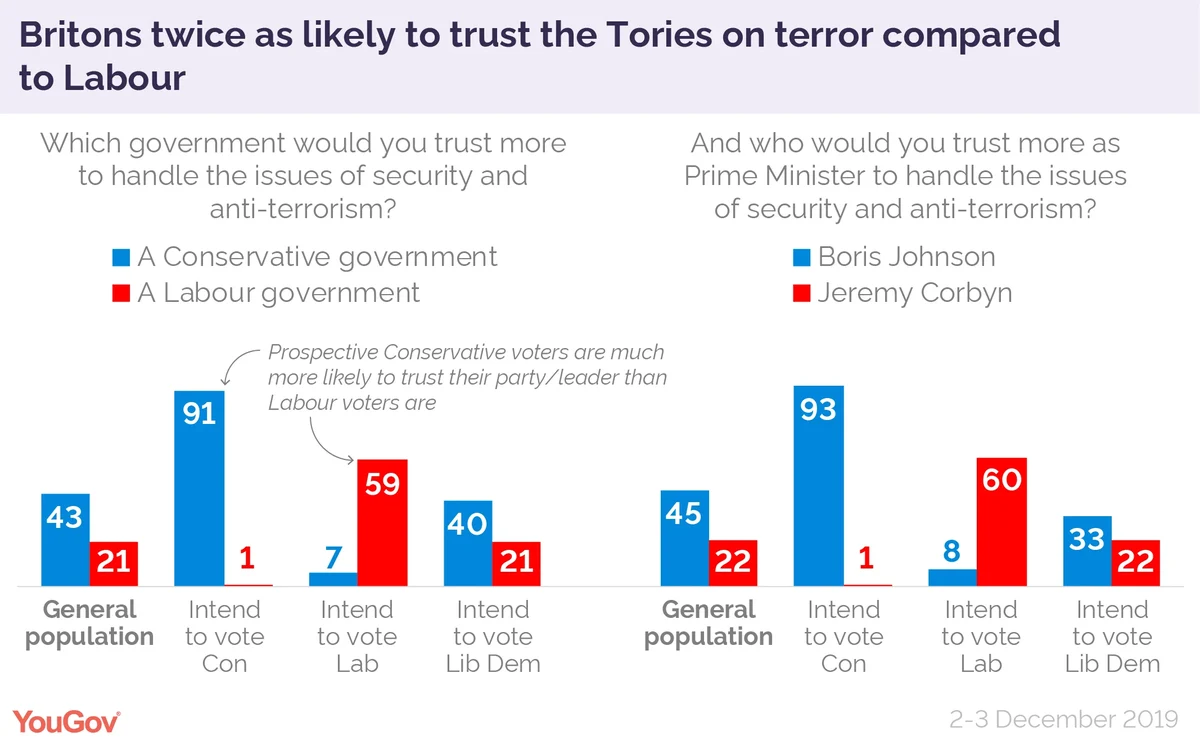Whether asking about parties or current leaders, Britons would rather see the Conservatives handle terror and security issues than Labour
Despite the recent London Bridge attacks taking place on the Conservative Party’s watch, new YouGov data shows that the public are twice as likely to trust the Tories to handle issues of security and terrorism than Labour.
Some 43% of Britons would rather Conservatives take the lead, and only 21% Labour. Likewise, 45% trust Boris Johnson, and only 22% Jeremy Corbyn.
These figures are partisan, as you would expect, with those planning to vote Conservative more likely to trust the Tories and Johnson, and those planning to vote Labour more likely to trust Corbyn and his party.
More revealing is the lack of trust in Labour and Corbyn on the issue even among those who intend to vote for the party.
While 93% of prospective Tory voters trust Johnson over Corbyn, and 91% the Conservative Party over Labour, these figures fall to only 60% of potential Labour voters who trust Corbyn over Johnson and 59% who trust Labour over the Conservatives.
That being said, few Labour voters actually trust the Tories or Boris Johnson more (between 7% and 8%), but instead are much more likely to answer “don’t know” than their Conservative counterparts.
Britons want to see an end to automatic early release for terror suspects
The policy of automatic early release of prisoners has come under intense scrutiny, as the London Bridge attacker was revealed to have been freed under it. Our survey also finds that ending this practice has near-universal support.
Fully 82% of Britons would support a ban on early release for those convicted of terror-related crimes, including 95% of those planning to vote Conservative, 75% Labour and 79% Lib Dem. Only 9% of Britons are opposed.

A similar proportion of Britons (85%) would also be in favour of longer prison sentences for terrorists.
These are policies that the public also thinks would work. Two thirds of Britons (66%) think a ban on automatic early release for terrorists would significantly reduce the chance of terror attacks happening, although this indicates that some support the policy without thinking it will have any effect.
A majority (57%) also think that longer prison sentences would have a similar impact in reducing the terror risk. Most Britons also think increased surveillance of terrorists would help (77%), as would more police officers on the streets, but just 29% say the same of increased investment in rehabilitation.
This is perhaps unsurprising given that a separate YouGov survey this week found that 57% of Britons think it is only rarely possible – if at all – to rehabilitate those who have committed terror offences.
Attitudes to terrorism tracker data shows the impact the London Bridge attacks had on public opinion
YouGov has a longstanding set of standard questions on attitudes to terrorism which have usually been run in the wake of major incidents.
At the beginning of last month, however, these trackers were run in response to the Government’s downgrading of the terror threat level from “severe” to “substantial”. This means that, for the first time, we can compare public attitudes soon before and immediately after a terror attack.
Even in early November, mere days after the Government had downgraded the terror threat level for the first time in five years, 47% of Britons said that they felt that the danger of terrorism had increased over the same time period. Following the London Bridge attacks this figure now stands at 62%.

Confidence in the Government’s handling of the terror threat has slumped. Prior to the attacks 64% thought the Government were dealing with the matter effectively, compared to 20% who disagreed. After this most recent attack only 45% think the issue is being handled well, while 39% now think it’s being handled badly.
The overwhelming majority of Britons were already braced for terror attacks, with 80% thinking such attacks were likely when asked in early November. Asked again at the beginning of this month and this figure has increased to 87%.
Effectively unchanged, however, is people’s expectation that their own lives will be affected. Three quarters of Britons (74%) said that the odds that they themselves or a loved one would be harmed in an attack were low or non-existent in November. As of this week that figure remains exactly the same.
Only 10% think there is a high risk to themselves – within the margin of error from the 8% it was last month – although this figure is higher in London at 16%.
Photo: Getty









